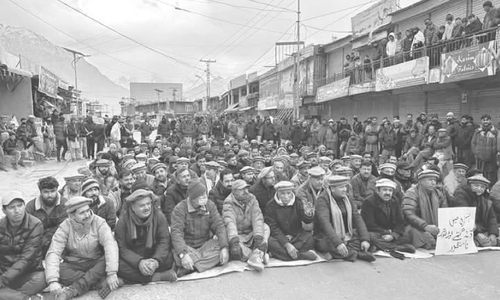A QUAINT Hindi metaphor nicely describes the results from the Karnataka state polls that saw Prime Minister Modi’s religious bigotry roundly thwarted. “Bhookhe bhajan na hoey, Gopala.” In other words: “Lord, much as we love you, it’s not possible to sing your praise on an empty stomach.” Indeed, while the BJP continued its communal rant against Muslims, their dress code, their food culture, and promoted religious polarisation to dip into a cynically assembled Hindu vote bank, the Congress stole a march on its opponent by committing to poverty alleviation, promising free rice to the poor, useful units of electricity, unemployment stipend for graduates and diploma holders, and free bus travel for women across the state.
Every detail that Rahul Gandhi had culled from his long march was put into the election manifesto. The party wouldn’t allow communal rhetoric by the BJP to shift focus from the yawning rich-poor disparity, a major issue with India’s IT hub. It squarely targeted crony capitalism for the mess, underscored by backing public ire against pervasive corruption. Simultaneously, the Congress promised to deal firmly with communal violence.
The promise rekindled the party’s lost habit to confront the Hindutva challenge boldly on two fronts, economic and social, by rallying against crony capitalism and poverty and a commitment to repair the social fabric damaged by BJP’s communal politics. Rewards came swiftly. Commitment to fight communalism saw traditional Muslim votes shift from their traditional support for former prime minister Deve Gowda’s Janata Dal (Secular) party. Its recent flirting with the BJP cost it dear, and shored up the Congress percentage of vote share to over 43 per cent, roughly a 5pc rise from 2018. However, the BJP vote stayed more or less uniform at 36pc. In other words, the Hindu right has kept its flock together, losing less than 0.5pc to the Congress.
While the BJP studiously shunned them, the Congress fielded 15 Muslim candidates of whom nine won. Symbolically and as material support to a hounded community, the Congress promised to restore a 4pc quota of reservation for jobs and admission in educational institutions for Muslims. The BJP had taken away the quota marked for the community and split the 4pc equally between two Hindu castes. Above all, the Congress promised to rein in vigilante assaults unleashed by groups like the Bajrang Dal and lumpen street brawlers sponsored by Hindutva minders. The Bajrang Dal is so called after Lord Rama’s heroic aide, Hanuman. An interesting aside in the elections was Mr Modi’s last minute bid at the fag end of the campaign to liken the Congress promise to shut down Bajrang Dal’s violence as an insult to Hanuman, and on cue it became the main narrative on TV channels loyal to the prime minister. The adverse results could be seen as a rebuke to Mr Modi’s equating the lumpen group with a revered deity.
Every detail that Rahul Gandhi had culled from his long march was put into the election manifesto.
Commonly known as ‘WhatsApp University’ its Muslim-baiting saw the BJP inventing two Hindu characters from a particular caste, claiming they were the ones who killed the Mysore ruler Tipu Sultan, the legendary challenger to British rule. Tipu eventually fell in May,1799 to a joint force of the Marathas, British troops and the army of the Nizam of Hyderabad. The BJP has been on a spree of overturning historical facts or making them vanish from schoolbooks.
To restore the impugned books and revive intellectual vigour, or generally to fortify the democratic institutions against future subversion, the opposition needs to defeat Mr Modi in 2024. Analysts see the Karnataka results in which the Congress has won an impressive 135 seats against the BJP’s 66 in a 224-seat House, as a prelude to that end. Before the general elections, however, there would be more contests later this year, in which the Congress faces the BJP. Elections in Congress-ruled Rajasthan and BJP-ruled Madhya Pradesh in particular would be crucial pointers to the headwinds ahead.
Winning back power from the BJP in a southern state is possibly easier than fighting a communal challenge in a northern state. There is a clear north-south divide in communal politics. When Indira Gandhi was routed in the post-emergency elections in the north, the southern states stood resolutely with the Congress in 1977. Mrs Gandhi began her revival from Karnataka, winning the Lok Sabha seat vacated for her in Chikmaglur. A slogan mocked the Janata Party, which collapsed with internal feuding soon after routing the Congress. “Ek sherni sao langur. Chikmagalur bhai Chikmagalur.” (One tigress is enough to take on 100 monkeys. Thank you Chikmagalur.) Could Karnataka again revive the Congress party’s fortunes?
The question can be framed differently. Would the magic of Rahul Gandhi’s long march shored up by powerful local leaders in Karnataka replicate in, say, Madhya Pradesh in a straight fight with the BJP? Also, the Congress is a house divided in Rajasthan, where the chief minister confessed to taking help from a former BJP counterpart to thwart an internal coup. Five years ago, the Congress managed to significantly win a 39.3pc vote share, 6pc more than what it got in 2013 when it won a paltry 21 seats. In comparison, the BJP’s votes went down from 45.2pc to 38.8pc, a difference of 6.4pc. Today, both are nearly at par. Much would depend on how the Congress positions itself with other opposition parties. Would they be able to arrive at a modus vivendi about their larger future soon, preferably with a common minimum programme to avoid ideological logjam? Karnataka is a good beginning, not least for the way the Congress has tackled attempts by the BJP to introduce communal discourse. It stuck to secular issues. The question is: will the northern voters be ready to sing paeans to anyone, on an empty stomach?
The writer is Dawn’s correspondent in Delhi.
Published in Dawn, May 16th, 2023












































Dear visitor, the comments section is undergoing an overhaul and will return soon.